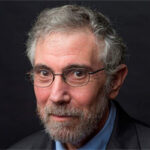Maria Abascal
New York University

Jordan Conwell
University of Texas at Austin
 Jordan Conwell is an associate professor of sociology at the University of Texas at Austin. He is also a Stone Center Affiliated Scholar. One strand of his research examines the relationship between educational opportunity and socioeconomic well-being across individuals’ lives, families’ generations, and historical time, often focusing on potential variation in these patterns by race, social class, and gender. His research on these topics has been published in leading journals such as Journal of Marriage and Family, Social Forces, and Sociology of Education and has been supported by Dissertation and Postdoctoral Fellowships from the National Academy of Education/Spencer Foundation and a CAREER award from the National Science Foundation. Conwell also maintains a research interest in the scientific contributions and legacy of pioneering social scientist W.E.B. Du Bois. He is currently coauthoring a book with sociologist Kevin Loughran that explores Du Bois’s methodological innovations and their implications for contemporary social science. Conwell earned his B.A. in Sociology and Rhetoric from Bates College and his M.A. and Ph.D. in sociology from Northwestern University.
Jordan Conwell is an associate professor of sociology at the University of Texas at Austin. He is also a Stone Center Affiliated Scholar. One strand of his research examines the relationship between educational opportunity and socioeconomic well-being across individuals’ lives, families’ generations, and historical time, often focusing on potential variation in these patterns by race, social class, and gender. His research on these topics has been published in leading journals such as Journal of Marriage and Family, Social Forces, and Sociology of Education and has been supported by Dissertation and Postdoctoral Fellowships from the National Academy of Education/Spencer Foundation and a CAREER award from the National Science Foundation. Conwell also maintains a research interest in the scientific contributions and legacy of pioneering social scientist W.E.B. Du Bois. He is currently coauthoring a book with sociologist Kevin Loughran that explores Du Bois’s methodological innovations and their implications for contemporary social science. Conwell earned his B.A. in Sociology and Rhetoric from Bates College and his M.A. and Ph.D. in sociology from Northwestern University.
Miles Corak
CUNY Graduate Center

Janet Gornick
CUNY Graduate Center
 Janet Gornick is a professor of political science and sociology at the Graduate Center, the James M. and Cathleen D. Stone Distinguished Chair in Socio-Economic Inequality, and the director of Stone Center. For 10 years, she served as director of LIS, a cross‐national data archive and research center located in Luxembourg; the Stone Center includes the U.S. Office of LIS. Most of Gornick’s research is comparative and concerns social welfare policies and their impact on gender disparities in the labor market, income inequality, and/or wealth concentration. She is the co‐author or coeditor of four books: Families That Work: Policies for Reconciling Parenthood and Employment (2003); Gender Equality: Transforming Family Divisions of Labor (2009); Income Inequality: Economic Disparities and the Middle Class in Affluent Countries (2013); and Measuring Distribution and Mobility of Income and Wealth (2022). She has published articles in many journals, including American Sociological Review, Annual Review of Sociology, Social Forces, Socio‐Economic Review, Journal of European Social Policy, European Sociological Review, and Social Science Quarterly. She serves on several advisory and editorial boards, regularly presents her work in popular venues, including The American Prospect, Dissent, and Challenge Magazine.
Janet Gornick is a professor of political science and sociology at the Graduate Center, the James M. and Cathleen D. Stone Distinguished Chair in Socio-Economic Inequality, and the director of Stone Center. For 10 years, she served as director of LIS, a cross‐national data archive and research center located in Luxembourg; the Stone Center includes the U.S. Office of LIS. Most of Gornick’s research is comparative and concerns social welfare policies and their impact on gender disparities in the labor market, income inequality, and/or wealth concentration. She is the co‐author or coeditor of four books: Families That Work: Policies for Reconciling Parenthood and Employment (2003); Gender Equality: Transforming Family Divisions of Labor (2009); Income Inequality: Economic Disparities and the Middle Class in Affluent Countries (2013); and Measuring Distribution and Mobility of Income and Wealth (2022). She has published articles in many journals, including American Sociological Review, Annual Review of Sociology, Social Forces, Socio‐Economic Review, Journal of European Social Policy, European Sociological Review, and Social Science Quarterly. She serves on several advisory and editorial boards, regularly presents her work in popular venues, including The American Prospect, Dissent, and Challenge Magazine.
Lane Kenworthy
University of California, San Diego
 Lane Kenworthy is a professor of sociology and the Yankelovich Chair in Social Thought at the University of California, San Diego. He is also a Stone Center Affiliated Scholar. Kenworthy studies the causes and consequences of living standards, poverty, inequality, mobility, employment, economic growth, social policy, taxes, public opinion, politics, and more in the United States and other affluent countries. His books include The Good Society (lanekenworthy.net), Is Inequality the Problem?, Would Democratic Socialism Be Better?, Social Democratic Capitalism, How Big Should Our Government Be? (with Jon Bakija, Peter Lindert, and Jeff Madrick), Social Democratic America, Progress for the Poor, Jobs with Equality, Egalitarian Capitalism, and In Search of National Economic Success.
Lane Kenworthy is a professor of sociology and the Yankelovich Chair in Social Thought at the University of California, San Diego. He is also a Stone Center Affiliated Scholar. Kenworthy studies the causes and consequences of living standards, poverty, inequality, mobility, employment, economic growth, social policy, taxes, public opinion, politics, and more in the United States and other affluent countries. His books include The Good Society (lanekenworthy.net), Is Inequality the Problem?, Would Democratic Socialism Be Better?, Social Democratic Capitalism, How Big Should Our Government Be? (with Jon Bakija, Peter Lindert, and Jeff Madrick), Social Democratic America, Progress for the Poor, Jobs with Equality, Egalitarian Capitalism, and In Search of National Economic Success.
David J. Knight
Columbia University

Paul Krugman
CUNY Graduate Center
 Paul Krugman is a distinguished professor of economics at Graduate Center, a Stone Center Senior Scholar, and a LIS senior scholar. He previously taught at MIT, Stanford, and Princeton. He is the author or coauthor of many academic papers and numerous books aimed at both professional and general audiences, including Market Structure and Foreign Trade, Geography and Trade, The Return of Depression Economics, and Arguing with Zombies: Economics, Politics, and the Fight for a Better Future. In recognition of his work on international trade and economic geography, Krugman received the John Bates Clark award of the American Economic Association in 1991, the Prince of Asturias award for social sciences in 2004, and the Nobel Memorial Prize in Economic Sciences in 2008. For nearly 25 years, he was an op-ed columnist and commentator for The New York Times. In December 2024, he reintroduced his newsletter on Substack.com.
Paul Krugman is a distinguished professor of economics at Graduate Center, a Stone Center Senior Scholar, and a LIS senior scholar. He previously taught at MIT, Stanford, and Princeton. He is the author or coauthor of many academic papers and numerous books aimed at both professional and general audiences, including Market Structure and Foreign Trade, Geography and Trade, The Return of Depression Economics, and Arguing with Zombies: Economics, Politics, and the Fight for a Better Future. In recognition of his work on international trade and economic geography, Krugman received the John Bates Clark award of the American Economic Association in 1991, the Prince of Asturias award for social sciences in 2004, and the Nobel Memorial Prize in Economic Sciences in 2008. For nearly 25 years, he was an op-ed columnist and commentator for The New York Times. In December 2024, he reintroduced his newsletter on Substack.com.
Michael Martell
Bard College

Leslie McCall
CUNY Graduate Center
 Leslie McCall is a Presidential Professor of sociology and political science and the associate director of the Stone Center. She studies public opinion about inequality, opportunity, and related economic and policy issues; trends in actual earnings and family income inequality; and patterns of intersectional inequality. She is the author of The Undeserving Rich: American Beliefs about Inequality, Opportunity, and Redistribution and Complex Inequality: Gender, Class, and Race in the New Economy. Her research has also been published in a wide range of journals and edited volumes. She was formerly at Northwestern University, where she was a professor of sociology and political science (courtesy), as well as a faculty fellow at the Institute for Policy Research. While most of McCall’s published research to date focuses on inequality within the U.S. using existing survey data, her recently published and ongoing research branches out to incorporate other countries and new methodological approaches, including: studies of rising economic inequality among families and declining gender inequality using new demographic measures; media coverage of economic inequality since the 1980s using new machine learning tools; and public views about inequality, opportunity, and redistribution using survey experimental methods and new questions fielded on major international surveys.
Leslie McCall is a Presidential Professor of sociology and political science and the associate director of the Stone Center. She studies public opinion about inequality, opportunity, and related economic and policy issues; trends in actual earnings and family income inequality; and patterns of intersectional inequality. She is the author of The Undeserving Rich: American Beliefs about Inequality, Opportunity, and Redistribution and Complex Inequality: Gender, Class, and Race in the New Economy. Her research has also been published in a wide range of journals and edited volumes. She was formerly at Northwestern University, where she was a professor of sociology and political science (courtesy), as well as a faculty fellow at the Institute for Policy Research. While most of McCall’s published research to date focuses on inequality within the U.S. using existing survey data, her recently published and ongoing research branches out to incorporate other countries and new methodological approaches, including: studies of rising economic inequality among families and declining gender inequality using new demographic measures; media coverage of economic inequality since the 1980s using new machine learning tools; and public views about inequality, opportunity, and redistribution using survey experimental methods and new questions fielded on major international surveys.
Branko Milanovic
CUNY Graduate Center
 Branko Milanovic is a research professor at the Graduate Center and a Senior Scholar at the Stone Center. He served as lead economist in the World Bank’s Research Department for almost 20 years, leaving to write his book on global income inequality, Worlds Apart. He was a senior associate at the Carnegie Endowment for International Peace in Washington and has held teaching appointments at the University of Maryland and at the Paul H. Nitze School of Advanced International Studies at Johns Hopkins University. His main area of work is income inequality, in individual countries and globally, including in preindustrial societies. His book The Haves and the Have-nots was selected by The Globalist as the 2011 Book of the Year. Global Inequality was awarded the Bruno Kreisky Prize for the best political book of 2016 and the Hans Matthöfer Prize in 2018. Milanovic was awarded (jointly with Mariana Mazzucato) the 2018 Leontief Prize for Advancing the Frontiers of Economic Knowledge. His most recent books are Capitalism, Alone, published in 2019, and Visions of Inequality, published in 2023.
Branko Milanovic is a research professor at the Graduate Center and a Senior Scholar at the Stone Center. He served as lead economist in the World Bank’s Research Department for almost 20 years, leaving to write his book on global income inequality, Worlds Apart. He was a senior associate at the Carnegie Endowment for International Peace in Washington and has held teaching appointments at the University of Maryland and at the Paul H. Nitze School of Advanced International Studies at Johns Hopkins University. His main area of work is income inequality, in individual countries and globally, including in preindustrial societies. His book The Haves and the Have-nots was selected by The Globalist as the 2011 Book of the Year. Global Inequality was awarded the Bruno Kreisky Prize for the best political book of 2016 and the Hans Matthöfer Prize in 2018. Milanovic was awarded (jointly with Mariana Mazzucato) the 2018 Leontief Prize for Advancing the Frontiers of Economic Knowledge. His most recent books are Capitalism, Alone, published in 2019, and Visions of Inequality, published in 2023.
Salvatore Morelli
Roma Tre University
 Salvatore Morelli is the director of the GC Wealth Project and a Senior Scholar at the Stone Center. He is currently an associate professor in public economics in the Law Department at Roma Tre University. He holds a DPhil in Economics from the University of Oxford and is also a research associate at the Center for Studies of Economics and Finance (CSEF) at the University of Naples Federico II. Morelli’s current research projects focus on the economics of inheritance taxation, the interaction between economic inequality and climate crisis, and the estimation of personal wealth concentration and its evolution over time. His research to date has also investigated the distributional effect of macroeconomic crises, with particular reference to top income groups; the empirical and theoretical foundations of the view that inequality may contribute to economic and financial instability; and the evolution and measurement of several dimensions of economic inequality over time for a series of countries.
Salvatore Morelli is the director of the GC Wealth Project and a Senior Scholar at the Stone Center. He is currently an associate professor in public economics in the Law Department at Roma Tre University. He holds a DPhil in Economics from the University of Oxford and is also a research associate at the Center for Studies of Economics and Finance (CSEF) at the University of Naples Federico II. Morelli’s current research projects focus on the economics of inheritance taxation, the interaction between economic inequality and climate crisis, and the estimation of personal wealth concentration and its evolution over time. His research to date has also investigated the distributional effect of macroeconomic crises, with particular reference to top income groups; the empirical and theoretical foundations of the view that inequality may contribute to economic and financial instability; and the evolution and measurement of several dimensions of economic inequality over time for a series of countries.
Núria Rodríguez-Planas
CUNY Graduate Center
 Núria Rodríguez-Planas is professor of economics at Queens College, CUNY, and at the Graduate Center. In 2023, she received a 5-year ERC Advanced Grant from the European Research Council to lead the project “The Causal Effect of Motherhood, Gender Norms, and Cash Transfers to Women on Intimate Partner Violence (WomEmpower)” with as host institution the Economics Department of the Universitat de Barcelona. Since 2024, she has been a Distinguished Researcher at the Institut d’Economia de Barcelona and the Economics Department at the Universitat de Barcelona where she leads the Research Program: Gender, Institutions, and Culture. She is also a Russell Sage Foundation Scholar (cohort 2023-2024). She is a member of the Gender Gap Advisory Council of the Department of Inclusion, Social Security and Migration of Spain (Ministerio de Inclusión, Seguridad Social y Migraciones, MISSM) from 2024-26; and a member of the Executive Committee of the Society of Economics of the Household (2023-27). She was the managing editor of the IZA Journal of Labor Policy (2012-23). She has also held positions in Washington as an economist at Mathematica Policy Research, the Board of Governors of the Federal Reserve System, and the Brookings Institution.
Núria Rodríguez-Planas is professor of economics at Queens College, CUNY, and at the Graduate Center. In 2023, she received a 5-year ERC Advanced Grant from the European Research Council to lead the project “The Causal Effect of Motherhood, Gender Norms, and Cash Transfers to Women on Intimate Partner Violence (WomEmpower)” with as host institution the Economics Department of the Universitat de Barcelona. Since 2024, she has been a Distinguished Researcher at the Institut d’Economia de Barcelona and the Economics Department at the Universitat de Barcelona where she leads the Research Program: Gender, Institutions, and Culture. She is also a Russell Sage Foundation Scholar (cohort 2023-2024). She is a member of the Gender Gap Advisory Council of the Department of Inclusion, Social Security and Migration of Spain (Ministerio de Inclusión, Seguridad Social y Migraciones, MISSM) from 2024-26; and a member of the Executive Committee of the Society of Economics of the Household (2023-27). She was the managing editor of the IZA Journal of Labor Policy (2012-23). She has also held positions in Washington as an economist at Mathematica Policy Research, the Board of Governors of the Federal Reserve System, and the Brookings Institution.
William Solecki
CUNY Graduate Center

Xi Song
University of Pennsylvania

Florencia Torche
Princeton University

Van Tran
CUNY Graduate Center
 Van Tran is a professor of sociology, Black, race and ethnic studies, and international migration studies. He specializes in the study of race, ethnicity, migration, and urban inequality in New York City. His published research has examined the integration of Asian and Hispanic immigrants and their children in the US, concentrated incarceration and the public-housing-to-prison pipeline, Asian American racial attitudes, and intra-racial group diversity and its implications for ethnoracial equality. His current research centers on the voices of vulnerable Asian Americans — the least integrated and most vulnerable segments of this population, including recent Asian refugees and low-income Asian elders. In 2024, Tran established the multidisciplinary Ph.D. Program in Black, Race, and Ethnic Studies — the first of its kind in the New York metropolitan area — funded by the Mellon Foundation.
Van Tran is a professor of sociology, Black, race and ethnic studies, and international migration studies. He specializes in the study of race, ethnicity, migration, and urban inequality in New York City. His published research has examined the integration of Asian and Hispanic immigrants and their children in the US, concentrated incarceration and the public-housing-to-prison pipeline, Asian American racial attitudes, and intra-racial group diversity and its implications for ethnoracial equality. His current research centers on the voices of vulnerable Asian Americans — the least integrated and most vulnerable segments of this population, including recent Asian refugees and low-income Asian elders. In 2024, Tran established the multidisciplinary Ph.D. Program in Black, Race, and Ethnic Studies — the first of its kind in the New York metropolitan area — funded by the Mellon Foundation.
Hannah Walker
University of Texas at Austin
 Hannah Walker is an associate professor of government at the University of Texas at Austin. Her research examines the impact of the criminal justice system on American democracy with special attention to minority and immigrant communities. Her book, Mobilized by Injustice, explores the impact of experiences with the criminal justice system on political engagement, with particular interest in the conditions under which people decide to contest punitive policies in the United States. Current research builds on the book to take an in-depth look at the intersections of immigration and criminal justice, and the means by which Latinx communities are specifically targeted by these policies. A series of field experiments evaluates best strategies for mobilizing people with felony convictions to register and vote. A final suite of projects examines the politics of policing and possibilities for harm-reductive reforms. She received her Ph.D. from the University of Washington and her B.A. from Washington State University.
Hannah Walker is an associate professor of government at the University of Texas at Austin. Her research examines the impact of the criminal justice system on American democracy with special attention to minority and immigrant communities. Her book, Mobilized by Injustice, explores the impact of experiences with the criminal justice system on political engagement, with particular interest in the conditions under which people decide to contest punitive policies in the United States. Current research builds on the book to take an in-depth look at the intersections of immigration and criminal justice, and the means by which Latinx communities are specifically targeted by these policies. A series of field experiments evaluates best strategies for mobilizing people with felony convictions to register and vote. A final suite of projects examines the politics of policing and possibilities for harm-reductive reforms. She received her Ph.D. from the University of Washington and her B.A. from Washington State University.
Adia Harvey Wingfield
Washington University in St. Louis

Wenfei Xu
Cornell University



